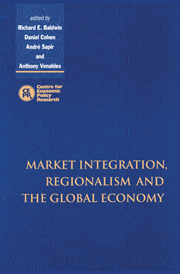Book contents
- Frontmatter
- Contents
- List of figures
- List of tables
- Preface
- Acknowledgements
- List of conference participants
- 1 Introduction
- PART ONE REGIONALISM AND THE GLOBAL ECONOMY
- 2 Regionalism vs. multilateralism
- Discussion
- 3 Preferential agreements and the multilateral trading system
- Discussion
- 4 Politics and trade policy
- Discussion
- 5 Globalisation and labour, or: if globalisation is a bowl of cherries, why are there so many glum faces around the table?
- Discussion
- 6 Openness and wage inequality in developing countries: the Latin American challenge to East Asian conventional wisdom
- Discussion
- PART TWO MARKET INTEGRATION AND REGIONALISM
- Index
4 - Politics and trade policy
Published online by Cambridge University Press: 24 February 2010
- Frontmatter
- Contents
- List of figures
- List of tables
- Preface
- Acknowledgements
- List of conference participants
- 1 Introduction
- PART ONE REGIONALISM AND THE GLOBAL ECONOMY
- 2 Regionalism vs. multilateralism
- Discussion
- 3 Preferential agreements and the multilateral trading system
- Discussion
- 4 Politics and trade policy
- Discussion
- 5 Globalisation and labour, or: if globalisation is a bowl of cherries, why are there so many glum faces around the table?
- Discussion
- 6 Openness and wage inequality in developing countries: the Latin American challenge to East Asian conventional wisdom
- Discussion
- PART TWO MARKET INTEGRATION AND REGIONALISM
- Index
Summary
Introduction
Economists have devoted much effort to the study of efficiency properties of trade policies. These efforts have produced a coherent body of literature that describes how trade policy instruments – such as tariffs, export subsidies, quotas or voluntary export restraints (VERS) – affect economies that trade with each other. And they produced empirical models that have been extensively used to evaluate the efficiency losses from trade policies on the one hand and prospective gains from trade reforms on the other. Examples include quantitative studies of the Single Market programme in Europe (e.g. Flam, 1992) and of the NAFTA (e.g. Garber, 1993).
At the same time another strand of the literature has examined possible explanations for prevailing trade policies. Here efficiency considerations have not played centre stage. Many policies – such as quotas and VERS – impose large burdens on society. Researchers therefore looked for objectives of the policy-makers other than overall efficiency in order to explain them. This literature emphasises distributional considerations. It views trade policy as a device for income transfers to preferred groups in society. And it explains the desire of a policy-maker to engage in this sort of costly transfer by means of political arguments in her objective function (see Hillman, 1989, for a review).
Political economy explanations of trade policies are important, because they help us to understand the structure of protection as well as the major public policy debates.
- Type
- Chapter
- Information
- Market Integration, Regionalism and the Global Economy , pp. 86 - 112Publisher: Cambridge University PressPrint publication year: 1999



